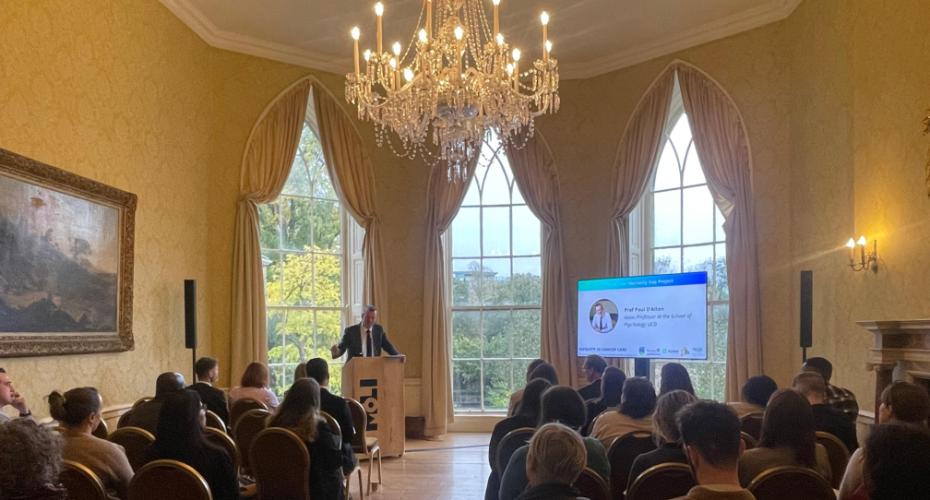Close the mortality gap for people with severe mental illness and cancer
Thursday, 23 October, 2025

“It’s unacceptable, an injustice, a violation of human rights.”
That’s according to psychologist Professor Paul D’Alton, speaking about the 30-year ‘mortality gap’ that emerges when people living with serious mental illness develop cancer.
One in every two people in Ireland will have cancer in their lifetime, but for those living with severe mental illness such as schizophrenia, bipolar disorder or major depression, their chances of surviving the disease are drastically different, and were the focus of a Policy Dialogue on Inequity in Cancer Care event in Dublin.
“In the cancer treatment system in Ireland, thankfully people in general are doing so much better than they were even 10 years ago, and if you can get onto treatment and stay on that treatment your chances of survival go up,” explains Professor D’Alton, who is an Associate Professor at the University College Dublin School of Psychology.
“But we know that people with severe mental illness have challenges in accessing treatment, they face stigma and delayed diagnosis and have additional needs, and then they are more likely to fall out of the system, leading to up to a 30-year difference in their life-expectancy compared to someone who does not have severe mental illness with cancer.”
International research shows that when a person with severe mental illness is assigned a ‘navigator, a trained nurse or social worker who can guide them through the system, their chances of survival go up, notes Professor D’Alton.
“The evidence is there that we can help people with severe mental illness to undergo treatments more completely, we can actually do something to address one of the most profound inequities in our healthcare system,” he says. ‘And through policy dialogue we want to influence national policy to support these vulnerable patients.”
At the event in the Museum of Literature Ireland in central Dublin, clinicians, researchers, policymakers and patient advocates heard about international developments and discussed how Ireland can advance policies to support people with severe mental health issues who develop cancer.
Delegates heard from Dr. Kelly Irwin, Faculty Psychiatrist at the Massachusetts Hospital Cancer Center, about how people living with severe mental illness may encounter difficulties understanding diagnoses, engaging with treatments and gaining access to clinical trials that offer new therapies, and described how the BRIDGE project halved the disruptions in cancer care for people living with severe mental illness.
Dr. Pernille Bidstrup, Senior Researcher and Psychologist at the Danish Cancer Institute, spoke about the importance of building trust with people living with severe mental illness who need to access cancer care, and the success of the STARS programme in Denmark.
Professor William Gallagher, Professor of Cancer Biology at UCD and co-lead of the All-Island Cancer Research Institute stresses that while we have made enormous progress to better understand and manage cancer, many inequities still exist when it comes to cancer within the health ecosystem.
“The cancer journey of those individuals who have pre-existing mental health difficulties is fraught with challenges,” he says. “This event is key to ensuring that inequities in this aspect are identified and dealt with from a policy perspective.”
Bringing people from different disciplines and backgrounds together to discuss the inequity in cancer care can act as a catalyst for change, says Dr Elva O;Sullivan, Engagement Manager for UCD Institute for Discovery, which co-hosted the event.
“The inequity and mortality gap for people with severe mental illness are major issues in healthcare today, and we need input from across disciplines and practice and experience to address them,” she says. “The Policy Dialogue is a forum where people can meet with a common focus, and synergies can bring about change.”
Welcoming delegates on the day, Professor Patricia Maguire, Professor of Biochemistry at UCD School of Biomolecular and Biomedical Science and Director of the UCD Institute for Discovery, spoke of the need for the brilliant minds in the room to work together to develop a comprehensive policy document that can influence Ireland’s cancer strategy.
“Magic happens at the interfaces between disciplines,” said Professor Maguire. “And the costs of inaction here are in lives.”
The Policy Dialogue was run in collaboration with the European Observatory on Health Systems and Policies, a partnership hosted by the WHO, and the ECHoS programme, an EU Cancer Mission project which is establishing National Cancer Mission Hubs around Europe ((opens in a new window)https://cancermissionhubs.eu). The All-Island Cancer Research Institute ((opens in a new window)www.aicri.org), via UCD, is one of two Irish partners in the ECHoS project, along with the National Cancer Control Programme (NCCP). The event was hosted by AICRI and NCCP, together with the UCD Institute for Discovery.